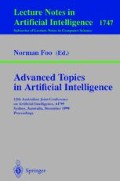Abstract
Our proposed method enables us to promptly and easily input Japanese sentences into a small device. All the keys for input are only 12 keys, which are 0, 1,..., 9, * and #. Therefore, we are able to input one Kana character per one keystroke. Furthermore, the system based on our method automatically generates the dictionary adapted to the target field because the system automatically acquires words by using inductive learning. The system is improved by its own learning ability.
Access this chapter
Tax calculation will be finalised at checkout
Purchases are for personal use only
References
Kushler, C: AAC USING A REDUCED KEYBOARD. Proc. CSUN98, Los Angeles, America, Mar. 1998.
Higashida, M.: A Fully Automated Directory Assistance Service that Accommodates Degenerated Keyword Input Via Telephone. Proc. PTC’97, pp. 167–174, Honolulu, Hawaii, Jan. 1997.
Araki, K., Momouchi, Y. and Tochinai, K.: Evaluation for adaptability of Kana-Kanji translation of non-segmented Japanese Kana sentences using inductive learning. Conference Working Papers of PACLING-II, pp. 1–7, Brisbane, Australia, Aug. 1995.
Araki, K., Takahashi, Y., Momouchi, Y. and Tochinai, K.: Non-Segmented Kana-Kanji Translation Using Inductive Learning. The Transactions of The Institute of Electronics, Information and Communication Engineers, Vol. J79-D-II, No. 3, pp. 391–402, Mar. 1996.
Nagao, M., Mori, S.: A New Method of N-gram Statistics for Large Number of n and Automatic Extraction of Words and Phrases from Large Text Data of Japanese. proc. COLING94, pp. 2093–2100, Kyoto, Japan, Aug. 1994.
Author information
Authors and Affiliations
Editor information
Editors and Affiliations
Rights and permissions
Copyright information
© 1999 Springer-Verlag Berlin Heidelberg
About this paper
Cite this paper
Matsuhara, M., Araki, K., Momouchi, Y., Tochinai, K. (1999). Evaluation of Number-Kanji Translation Method of Non-Segmented Japanese Sentences Using Inductive Learning with Degenerated Input. In: Foo, N. (eds) Advanced Topics in Artificial Intelligence. AI 1999. Lecture Notes in Computer Science(), vol 1747. Springer, Berlin, Heidelberg. https://doi.org/10.1007/3-540-46695-9_43
Download citation
DOI: https://doi.org/10.1007/3-540-46695-9_43
Publisher Name: Springer, Berlin, Heidelberg
Print ISBN: 978-3-540-66822-0
Online ISBN: 978-3-540-46695-6
eBook Packages: Springer Book Archive

